Belt and Road Forum for International Cooperation
The Belt and Road Forum for International Cooperation (also known as the Belt and Road Forum or BaRF)[1] is an international political and economical forum.
| Wikimedia Commons has media related to Belt and Road forum for international cooperation. |
2017
The event was first held on 14 and 15 May 2017 in Beijing, and drew 29 foreign heads of state and government and representatives from more than 130 countries and 70 international organizations.[2]
Agenda and activities
The purpose of the forum is described by Wang Xiaotao, deputy head of the National Development and Reform Commission, in an interview with Xinhua as building "a more open and efficient international cooperation platform; a closer, stronger partnership network; and to push for a more just, reasonable and balanced international governance system."[3] Western media coverage portrays the forum in a similar way with CNN referring to the event under the headline "China's new world order" and the Los Angeles Times running the article "Globalization 2.0: How China's two-day summit aims to shape a new world order".[4][5]
There will be an opening ceremony and high level meetings including a plenary session and six parallel panel discussions during the first day.[3] A round table summit will be held on the second day, chaired by President Xi Jinping with the participation of all attending heads of state and government and heads of the UN, World Bank, and International Monetary Fund.[3] At the conclusion of the round-table summit, the body will issue a document agreeing to goals and principles for the initiative.[3]
The forum will be a platform for working out action plans for implementation of the initiative in the areas of infrastructure, energy and resources, production capacity, trade and investment and identification of major projects.[3] It is also intended to be an opportunity for the signing of cooperation agreements with countries and international organizations in the areas of financial cooperation mechanism; a cooperation platform for science, technology and environmental protection; and enhanced exchanges and training of talent and financing agreements for backing projects.[3]
Attendance
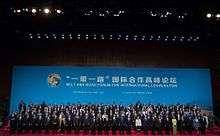
Heads of state and government
![]()
- President Xi Jinping
- Premier Li Keqiang
- Vice-Premier Zhang Gaoli
The forum is attended by 29 foreign heads of state and government and their respective delegations:[6]






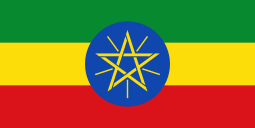


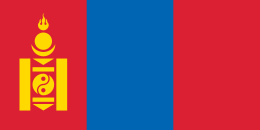
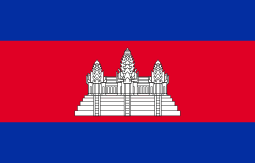

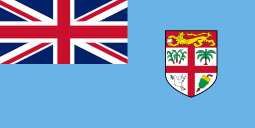




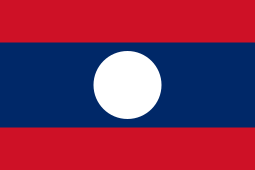




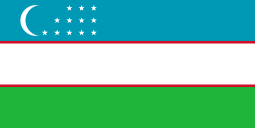
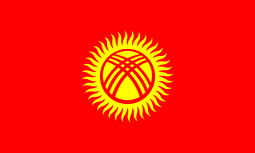





Heads of international organizations

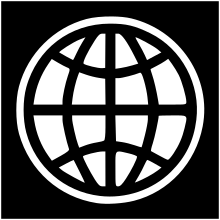
- Managing director of the International Monetary Fund, Christine Lagarde
- Director-General of the International Renewable Energy Agency, Adnan Z. Amin
- Executive Chairman of the World Economic Forum, Klaus Schwab
- President of the United Nations General Assembly, Peter Thomson[7]
- Secretary General of the European Bank for Reconstruction and Development, Enzo Quattrociocche
- Interpol Secretary General Jürgen Stock[8]
- Director General of the World Trade Organization Roberto Azevêdo[9]

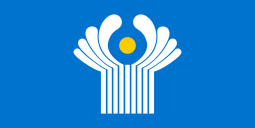
- Director General of the World Health Organization Margaret Chan[11]
Ministerial level The online magazine The Diplomat documents the following incomplete list of ministerial level attendees.[6]
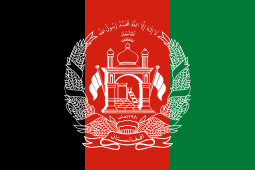
.svg.png)










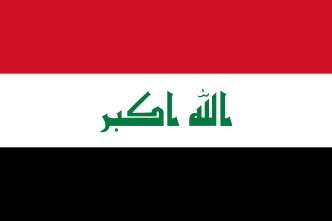

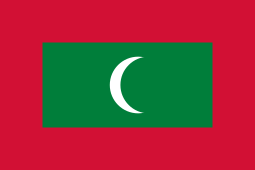


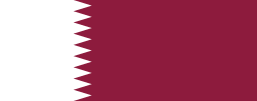






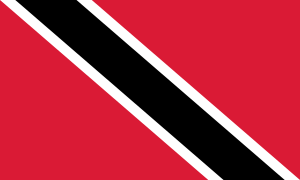






Venues
In 2017 the events were held at National Convention Center in the urban Chaoyang District and Yanqi Lake International Convention Center and Jixian hall at Yanqi Lake Conference Center in the outer suburb Huairou District.[17]
The opening ceremony, the plenary session of a high-level meeting, as well as six parallel thematic meetings were staged at the National Convention Center while the main venues of the forum and leaders' roundtable summit were held at the Yanqi venues.
2019
A second Belt and Road Forum was held from 25 to 27 April 2019 in Beijing.[1] Leaders of 40 countries and international organizations attended the Forum, A Joint Communique of 283 concrete results in six categories was announced at the end of the Forum.[18]
References
- Parameswaran, Prashanth (May 7, 2019). "What's in China's New Belt and Road Recalibration?". The Diplomat.
- "Belt and Road Forum to bring about fresh ideas". State Council of the People's Republic of China. May 12, 2017.
- "Belt and Road forum agenda set". Xinhua News Agency. April 18, 2017.
- "China's new world order: Xi, Putin and others meet for Belt and Road Forum". CNN. May 14, 2017.
- "Globalization 2.0: How China's two-day summit aims to shape a new world order". Los Angeles Times. May 12, 2017.
- "Belt and Road Attendees List". The Diplomat. May 12, 2017.
- "Belt and Road Forum for International Cooperation – General Assembly of the United". United Nations. May 14, 2017. Retrieved May 17, 2017.
- "Interpol to help promote security along Belt & Road". China Radio International. May 14, 2017. Retrieved May 17, 2017.
- "The Belt and Road Forum for Int'l Cooperation". China Internet Information Center. May 13, 2017. Retrieved May 18, 2017.
- "China, UNESCO to enhance cooperation on Belt and Road". Xinhua News Agency. May 13, 2017. Retrieved May 22, 2017.
- "Liu Yandong meets with WHO Director-General Margaret Chan". National Health and Family Planning Commission. May 15, 2017. Retrieved May 22, 2017.
- "List of Deliverables of the Belt and Road Forum for International Cooperation". China Daily. May 16, 2017. Retrieved May 31, 2017.
- "Belt and Road Forum fuels energy deals". China Daily. May 21, 2017. Retrieved May 31, 2017.
- "HE Jassim bin Saif Al Sulaiti Appointed Minister of Transport and Communications". Ministry of Transport and Communications. May 15, 2017. Retrieved May 24, 2017.
- "U.S. to send delegation to China's Belt and Road summit". Reuters. May 12, 2017. Retrieved December 12, 2019.
- "Tokyo sends big delegation to China's Silk Road forum". Nikkei. May 13, 2017. Retrieved December 12, 2019.
- Zhu, Jingruo; He, Yong; Wang, Haonan (May 12, 2017). "Beijing ready for Belt and Road forum". People's Daily.
- Belt & Road News (April 28, 2019). "Joint Communique". Belt & Road News.
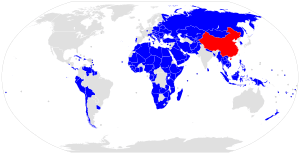
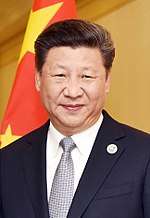
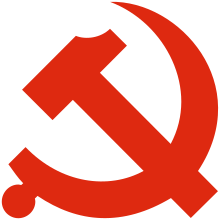
.svg.png)